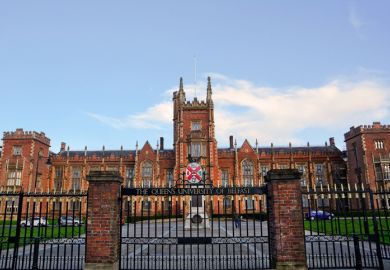‘Depression seems the most long-lasting stage of institutional grief’
In 1969, University of Chicago psychiatrist Elisabeth Kübler-Ross first published her famous model of the five stages of grief. More than half a century later, that model is a very good description of how people are feeling in scores of UK university departments, as they are hit by wave after wave of redundancy announcements.
It may seem strange to talk about sector cuts provoking grief akin to that caused by the loss of a loved one. Yet it’s hard to know how else to describe how it feels to be an individual academic among the sector-wide carnage, with nearly 90 universities making redundancies, many involving the closure of whole departments.
Being based in an area generally seen as attracting high numbers of students, we initially thought we would be spared. And even when the news of our institution’s precarious financial situation became too hard to ignore, we remained firmly in denial. “Surely the banks wouldn’t demand such drastic changes that entire degree programmes would have to close,” we told ourselves. “Surely we wouldn’t have to lose more professional services staff after they were just subject to a restructuring.”
Except that we were wrong on both counts. We have lost whole departments, entire degree programmes and scores of highly experienced professional service colleagues from essential roles.
Rage quickly followed. Last year’s staff satisfaction survey was so disastrous that some of the free text comments had to be redacted before it could be published. Staff were angry, both at senior management and at departmental colleagues on different teaching/research contract types, who they often felt were being given preferential treatment; both at line managers they felt weren’t doing enough to protect them and at line managers they felt were too adversarial with senior management, thereby making things worse. Grief can bring people together, but it can also divide us, particularly when it feels there is little we can realistically do to change what is happening to us.
We briefly tried the bargaining stage. My department did exceedingly well in the last Research Excellence Framework, and we had upped our student numbers every year at the request of the university. So perhaps we would be spared the worst if some people agreed to go part-time or if enough took voluntary severance. In the end, though, we lost nearly a dozen people to voluntary severance, only to be told that we are now expected to find even more “savings”.
At this point the “good” news is that another dozen colleagues are moving to universities in less dire financial straits. The bad news is that this means we will not have enough staff left to run core programmes come April.
Depression seems perhaps the most long-lasting stage of institutional grief. My department is internationally renowned for the critical work being done here and I, like many colleagues, joined specifically to be part of that. But first we were told that the university simply could no longer afford to fund our research time. Then we were told we would all have to do significantly more teaching. Then the senior management presentations quietly dropped my department from the areas it wanted to support.
I found myself sobbing every time I came into the office. It felt unimaginable that an intellectual project into which so many people had invested so much of their lives would simply fade away. I also cried when friends and colleagues told me they had found jobs elsewhere, and at the end-of-term party – which felt more like a wake for a dying department in a dying university.
It’s hard to know what acceptance could look like under these circumstances. Do we accept that many academics will no longer be able to find jobs in academia at all? That research will only be carried out at the most elite institutions, or by the lucky few elsewhere who manage to obtain large grants? That universities are now ruled by banks and management consultants who have no idea what it is like to teach students or do meaningful research?
What I love about my department is the brilliant, varied, critical work done by so many people all in one place, constantly in conversation with one another. I love the effort everyone has put into making this a genuinely welcoming and inclusive environment: the way senior colleagues genuinely support and mentor junior colleagues without turning it into a tickbox exercise for promotion applications. I love the fact that we attend each other’s weddings and birthday parties, that we are godparents for each other’s children, that we support each other during bereavements and medical crises.
I don’t think I am able to accept an idea of higher education where none of this is possible. I don’t think I can contemplate an academy where we are all just trying to survive another day of endless teaching. I don’t think I could bear an environment where the constant competition to keep our jobs causes us to lose sight of each other’s very humanity.
The author has chosen to remain anonymous.
‘These acute moments of panic and disorientation conceal deeper realignments’
Some years ago, at a workshop on research leadership, I listened to two talks given by the vice-principal of a nearby university and the director of a major funding council. The vice-principal told us we were “living in challenging times” and that, as “research innovators”, our work needed to provide “value for money”. The funding council lead, sitting next to the VP, nodded emphatically to this and, in their own speech, repeated the same core rhetoric nearly word for word. Both applauded each other, nodding encouragement.
Of course, any experienced academic will have heard these messages many times before. However, what was striking about these talks was the fact that they actually conveyed the exact opposite of one another. The university administrator wanted us to get as many big research grants as possible to justify our academic salaries, while the funding council lead wanted us to produce brilliant research on as little government funding as possible. It was, clearly, up to jobbing academics to somehow square this circle.
This, to me, is the bigger issue underlying the current financial turmoil in the UK higher education sector that has left many academic and professional services staff concerned for their careers, their mortgages and their families’ futures. These acute moments of panic and disorientation conceal deeper realignments in the tectonic plates of modern knowledge economies, which affect staff morale in chronic ways.
I am not personally persuaded that what is occurring in academia today is a product of anything as coherent as a policy of “austerity”. Rather, in the wake of 40 years of externally driven reform, we are experiencing cumulative confusion about what universities are for and what the substantive guiding values of academic life are.

The two talks mentioned above are emblematic of the many contradictory messages, policies and initiatives that universities and their staff are confronted with. Like many public institutions, universities have felt increasing pressure to be all things to all people. They must educate the majority of the young without receiving appropriate finances to do so. Students must, we are told, be treated as individuals, while their submitted work is increasingly anonymised, making it extremely hard for us to help them grow as writers and thinkers. They must be comprehensively supported through their degrees, while simultaneously instilled with the initiative, resilience and independence to thrive in the world of employment. And while we must treat them as paying customers from the day they arrive, they are equally treated as products for employers and taxpayers the day they leave.
Research, too, we are told, must be private and commercial on the one hand and publicly accountable and open access on the other. Universities must be world-leading centres of research, lean and efficiency-focused, while simultaneously hosting a burgeoning bureaucracy to address a vast swathe of social, political and legal obligations loaded on to them by successive national and local administrations.
Just like too many medicines taken together, too many initiatives undertaken at once can interfere with each other, creating tensions not just between higher education and its political masters, but also within universities – and especially between senior administrators (who often see these accretions as marks of cumulative quality) and those called upon to actually get research and teaching done on the ground.
In all of this, it has become unclear – to academics, administrators and policymakers alike – what universities’ job is, how it can be done well, and how it should be paid for. This leads to a collective loss of agreed purpose, arguably the most pernicious and profound effect of our present situation. Spread out over years and decades, such ambiguities breed cynicism and, more recently, a pervasive “quiet quitting”, most particularly because the effects of all of this are so corrosive on the things we do care about.
While commercial models may empower students as customers, it is far from clear that they empower them as students, scholars or scientists – or as future innovators, employees or employers. Indeed, quite the opposite seems to be the case.
More, the idea that students are merely customers has been increasingly mirrored by the idea that university academics are merely employees – and it is beginning to stick. This can only be a downward spiral: the academic inspired by ideals of scholarship, scientific advance and the pursuit of truth will usually happily do 50 per cent more than they are paid to do; the employee that has no other motive than to earn an agreed salary will work to rule.
None of this is because universities have lost their usefulness or value in the world: quite the opposite, I would argue. Rather, it is because the messages, both internally and externally, have become so confused and divergent.
This is most clearly a problem with regard to artificial intelligence. While university administrators tout Panglossian visions of the career opportunities these new technologies will deliver, the past two short years since ChatGPT was introduced demonstrate how naive that is. We have already reached the point where a free generative AI can produce a series of essay questions for a lecturer, answer them for the students and then assess and provide feedback on those answers, all within a matter of minutes. Whereupon, everyone could go to the pub absolutely none the wiser. The question, therefore, is not what we do with AI, but rather what we do with our human students and colleagues.
This is not a counsel of despair. But the inability of most policymakers and university administrators to forge a coherent and meaningful future for higher education – or even to stop multiplying the problem, means that it is left to the academics and students themselves to do the job – as perhaps it always should have been. The solution must be built from the inside. Otherwise, the edifice of higher education will just keep falling in on us.
Martin Mills is chair in anthropology at the University of Aberdeen.
The ‘Newcastle model’ is an existential threat to UK humanities
Staff at Newcastle University are rightly horrified by a memo they received on 22 January announcing senior management’s intention to cut 300 full-time-equivalent positions as part of emergency cost-saving plans. But every humanities scholar in the country should be horrified by the memo’s insidious threat to seek further savings by “reducing the proportion of research activity that is currently unfunded”.
This announcement follows already tight restrictions on using “unfunded” personal research allocations. Across much of the university, these have severely curtailed scholars’ ability to engage in core activities such as research travel and conference attendance. There is concern that the unspecified new measures will also threaten sabbaticals and reduce contractual staff time spent on research. And that will hit the humanities and social sciences hardest.
Such measures – not unique to Newcastle – are based on a particular understanding of how universities work based on the lab-based medical sciences: a lead researcher gets a large tranche of extramural cash from public, charitable or private sources to fund a lab/research project, PhD students, technicians, postdoctoral researchers and other expenses over several years.
But this model certainly does not even work for everyone in biomedical sciences. Scholars in the humanities, meanwhile, cannot access such large resources. There is no profit motive for global conglomerates to back research on, for example, women in medieval literature. And no one runs the London Marathon to raise money for cultural geography.

In Newcastle’s memo, “unfunded research” is a pejorative term masquerading as objective financial analysis. It is defined as “research not directly charged or recovered from externally funded research grants and contracts”. Humanities research relies on funding that universities can allocate as they see fit – from investments and endowments, but mostly from the Research Excellence Framework-linked quality-related (QR) block grants and student tuition-fee income. But in a university like Newcastle, student numbers in the humanities and social sciences typically dwarf those in the medical school, and their revenues subsidise wider university activities. Labelling research supported by institutional funding as “unfunded” is therefore misleading, as well as disparaging.
Like many UK academics, I work in a faculty where humanities scholars regularly compete for the limited extramural grants available. But as these grants tend to be fewer and individually smaller, we commonly undertake scholarship using just our contractual research time and our minimal institutional research allowances. Still, this institutionally funded research generates significant revenues through QR grants and the tuition fees that come from a reputation built on strong research-led teaching.
Such research also serves the broader public good. Take the work of one of Newcastle’s best-known humanities scholars, Joanne Smith Finley. She was one of a small group of international scholars who exposed the Chinese Communist Party’s large-scale, state terror repression of Muslim Uyghurs. Submitting evidence to governments and agencies around the world, she has influenced politicians’ human rights policies and contributed to their levying multilateral Magnitsky sanctions on China. The CCP sanctioned her in response.
As an ethnographer building on contacts made over three decades, she collected data by dedicating her limited but adequate annual research allowance and time to fund field trips to Xinjiang. Important, high-quality humanities scholarship like this can be undertaken even with minimal institutional funding. But it cannot be undertaken without it.
The new Chinese AI DeepSeek has been making waves recently. But ask it “Are Uyghur human rights abused in China?” and it spews out CCP propaganda about the Uyghurs “enjoy[ing] equal rights and freedoms” in a country celebrated for its “human rights endeavors”. The particular ability of the humanities to critically challenge oppressive and coercive power is becoming ever more important for democracy and truth in an age of AI and blustering demagogues. Yet the “Newcastle model” of research time allocation risks shrinking humanities departments to small numbers of over-worked staff whose primary function is to generate tuition revenues that subsidise the rest of the university. In that sense, the model is an existential threat to UK humanities.
None of this is to impute malicious intent to managers at Newcastle or any other university, all of whom are fellow academics dedicated to our great, common project of scholarship. Managers are correct that the UK’s higher education funding crisis requires us to tighten our belts. But there are other options – including renegotiating debts, slowing the pace of cuts, pausing capital spending, delaying new overseas commercial ventures, selling assets, and voluntary pay reductions across the board.
Newcastle’s branch of the University and College Union is currently balloting its members on industrial action. In 2016 they successfully defeated the university’s infamous “Raising the Bar” policy, management’s previous attempt to peg job security to extramural grant-winning. That victory was important not just for Newcastle: university managements look and learn from each other’s experiences.
Defeating the Newcastle model is even more important this time around. If it is implemented, it will reinforce a national trend that has already laid waste over the past two years to numerous UK humanities departments. The humanities are too important for us to allow the bleeding to go on.
Nick Megoran is professor of political geography at Newcastle University.
‘Scholarship is a shared collective endeavour or it is nothing’
The death of David Lodge on New Year’s Day served as a timely reminder that the atmosphere in UK universities wasn’t always so grim.
Lodge wrote a trilogy of brilliantly funny books portraying life in a fictional redbrick loosely modelled on the University of Birmingham, where he taught English from 1967 to 1987. One of my favourite of his characters is the hapless Phillip Swallow, who is intellectually unremarkable save for his gift for composing exam questions.
Cosy jobs for life even for such mediocrities are long gone, as the swathe of redundancies announced in recent weeks makes abundantly clear. The shift in most of the UK from a publicly funded university system to a competitive market has happened in the space of a working lifetime – and it is cutting many working lifetimes short.
In 2010 the threefold increase of tuition fees in England to £9,000 brought a generation out into the streets of London in protest. The Labour government plans to increase them for the first time since 2017 to £9,535. But while that figure is still viewed by many as unacceptably high, most universities make a loss on every single new home student they recruit.
Meanwhile, marketisation prompted a wave of debt-fuelled construction and expansion at a time of extraordinarily cheap credit. At-risk staff scowl as smoked glass and steel edifices continue to rise on the campuses of elite universities. Those edifices contain the obligatory nice coffee shop, of course – even as the existing cafes and eateries around campus visibly suffer from reduced university trade. The assumption of an effectively infinite supply of overseas student recruitment to bankroll all this is proving to be unfounded as political pressure to reduce immigration has its effects on student visa issuances.
In a way, the ideologues of the market transformation have been surprised by events that seem to get away from them at almost every turn. In a Guardian article last year, the Goldsmiths sociologist and political economist Will Davis argued that “the marketisation agenda has fallen apart because, like so many utopian plans, it was too optimistic. It underestimated the perverse incentives it would create for universities...It overestimated the health of the graduate labour market, and the speed with which loans would be repaid.”
The resulting reluctance from the Treasury to raise fees – funded domestically through student loans – has prompted the big players to take more and more students, to the detriment of the small, more bespoke institutions. This is resulting in cohorts so large that lecture halls aren’t big enough to hold them all, making it necessary to repeat lectures. This is not so bad, you might argue. After all, repeating lines is what theatre actors do nightly for weeks on end. But going through the same lecture script twice in quick succession can feel deadening, as if you were the human equivalent of an AI chatbot.
Nor are things any better in the devolved nations. The news of redundancies in “safe institutions” in Edinburgh or Cardiff reverberates everywhere and conveys that jobs are unsafe anywhere. Maligned senior managers feel the weight of having to make these decisions, and while the frustration can make them act cruelly, administering them keeps them awake at night. So many are fed up with an insatiable expectation to do more with less that will not necessarily guarantee their futures.

The vulnerabilities experienced in this climate are not equally distributed. The facts remain to be established, but my hunch is that it is often mid-career women and academic colleagues of colour who have lost out the most. At the same time, few new opportunities are available, and those there are, are largely early-career jobs.
That said, many of those who have left academia, either out of choice or through redundancy, are not tempted to try to find another university job. Piecing a sustainable livelihood together, even without the prospects of a generous pension, they find preferable to answering to those at the top of the academic class system.
Fear and insecurity are spreading across the sector in ways that I have not seen before, making people afraid to be openly critical. And while the survivors most traumatised by redundancy processes are eager to do almost anything to keep their jobs, many others become less amenable or collegiate, determined to just keep their heads down. They disengage from communal academic endeavour, such as departmental meetings and peer reviewing.
But the truth is that while scholarship is rewarded individually, it cannot be practised alone; it is a shared collective endeavour or it is nothing. Redundancies in one place damage us all. Unprecedented damage is being experienced everywhere in UK higher education at the moment, and we must find ways to repair it.
Les Back is subject group lead in sociology at the University of Glasgow.
Register to continue
Why register?
- Registration is free and only takes a moment
- Once registered, you can read 3 articles a month
- Sign up for our newsletter
Subscribe
Or subscribe for unlimited access to:
- Unlimited access to news, views, insights & reviews
- Digital editions
- Digital access to THE’s university and college rankings analysis
Already registered or a current subscriber? Login








